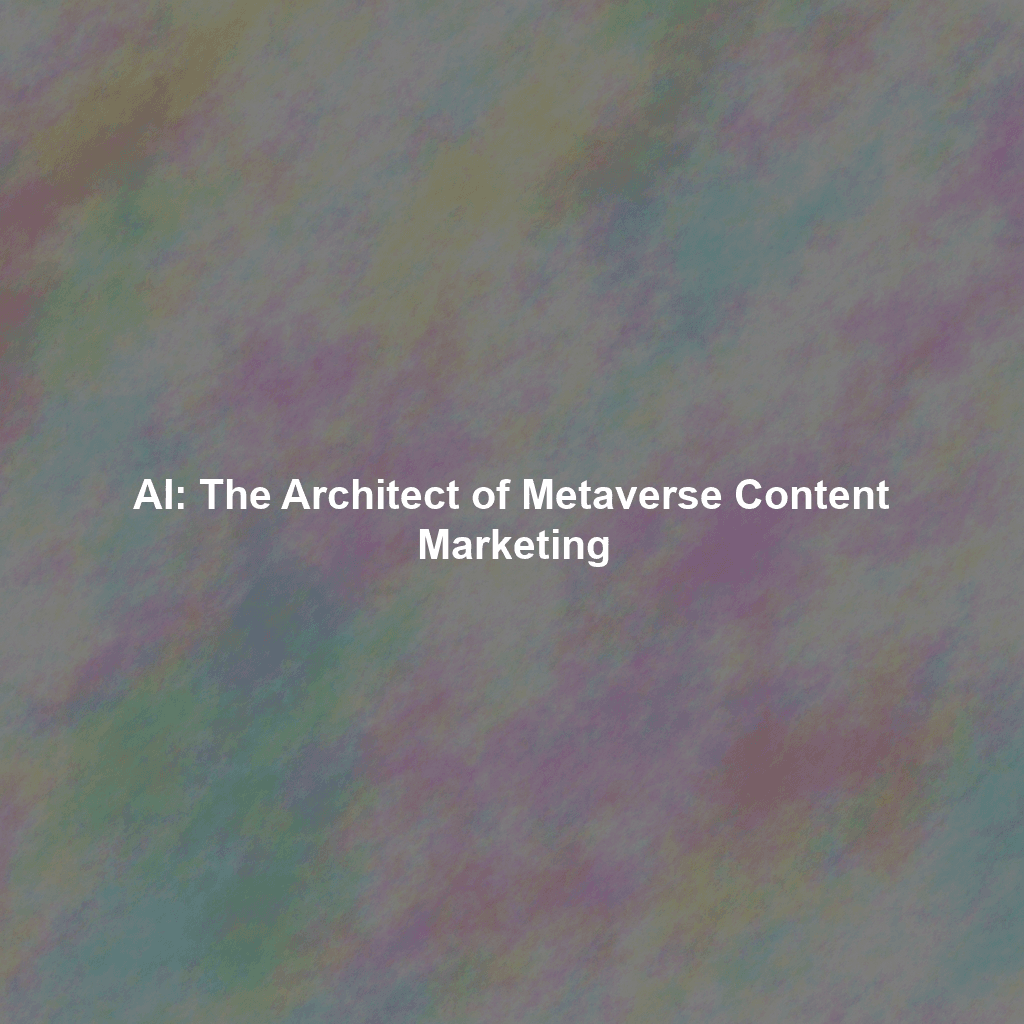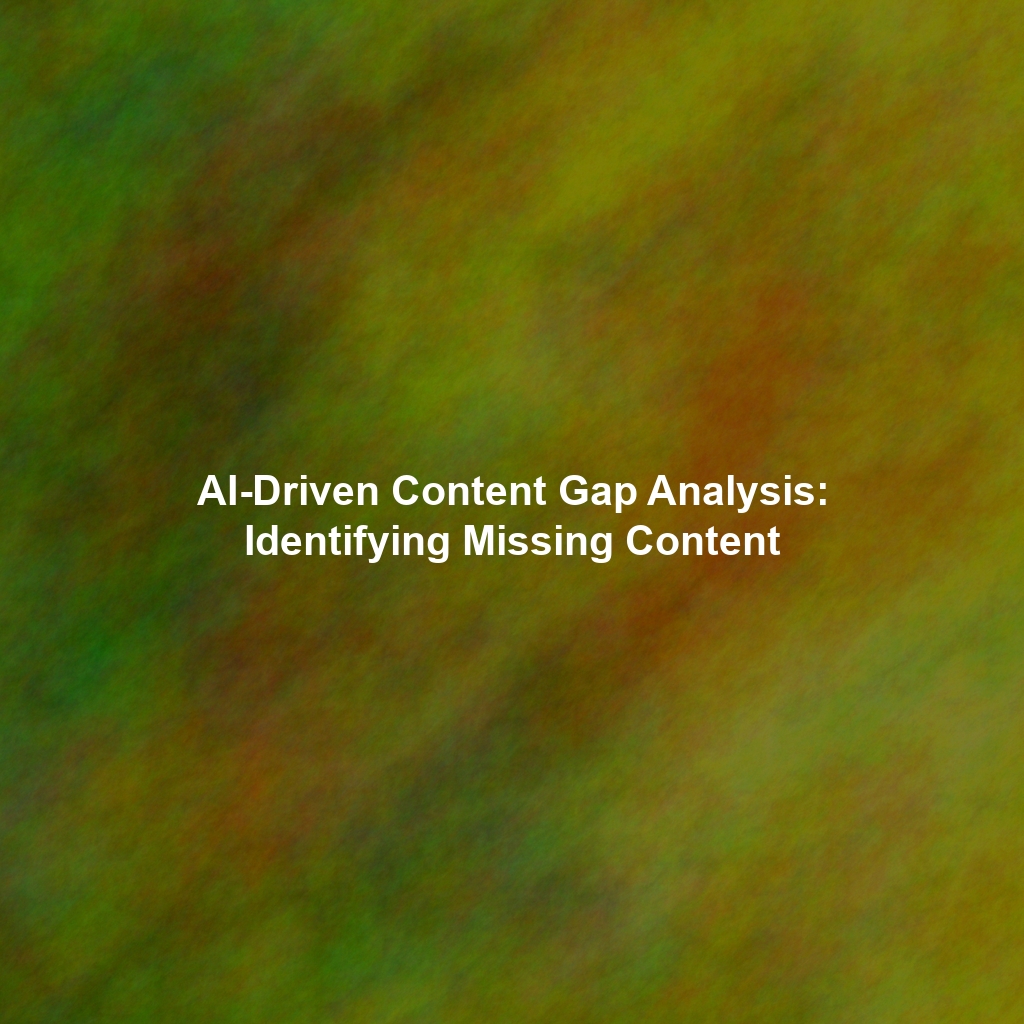The metaverse. It’s more than just buzz. It’s a burgeoning digital frontier, a constellation of interconnected virtual worlds where users interact, create, and transact. And as brands scramble to establish a foothold in this new reality, content marketing is emerging as a critical strategy. But the metaverse isn’t your average marketing landscape. Its dynamic, immersive nature demands a new level of personalization and interactivity. This is where Artificial Intelligence (AI) steps in, not just as a tool, but as a fundamental architect of engaging content experiences.
Why the Metaverse Demands a Different Content Marketing Approach
Traditional content marketing tactics, while still relevant in some contexts, often fall short in the metaverse. Think about it: articles, blog posts, and static images are less impactful when users are immersed in dynamic, interactive environments. The metaverse calls for content that’s:
- Immersive: Content needs to feel like a natural part of the virtual world, seamlessly integrated into the user’s experience.
- Interactive: Users want to participate, contribute, and shape the content they consume. Passive consumption is out; active engagement is in.
- Personalized: Generic messaging is easily ignored. Content needs to be tailored to individual preferences, interests, and behaviors within the virtual environment.
- Dynamic: The metaverse is constantly evolving. Content needs to be adaptable and responsive to real-time events and user feedback.
Meeting these demands manually is a daunting task. That’s why AI is essential. It empowers marketers to create, deliver, and optimize content at scale, ensuring relevance and maximizing engagement.
How AI is Revolutionizing Metaverse Content Marketing
AI is transforming various aspects of content marketing in the metaverse. Let’s explore some key applications:
1. AI-Powered Content Creation: Generating Immersive Experiences
One of the biggest challenges in metaverse content marketing is the sheer volume of content required to populate these virtual worlds. AI can significantly accelerate content creation through:
- Procedural Content Generation (PCG): AI algorithms can generate entire virtual environments, including landscapes, buildings, and props. This is particularly useful for creating expansive, dynamic worlds with limited human resources. Think of creating variations on virtual storefronts or generating unique textures for clothing items in a virtual boutique.
- AI-Assisted Storytelling: AI can help craft compelling narratives for virtual experiences. From generating dialogue for virtual characters to creating branching storylines based on user choices, AI can enhance the narrative depth and engagement of metaverse content.
- Virtual Influencer Creation and Management: AI can power virtual influencers, creating realistic avatars with unique personalities and voices. These influencers can promote products, interact with users, and even create their own content within the metaverse, offering brands a scalable and engaging presence.
- Automated Script Generation for Interactive Experiences: AI can generate scripts for interactive experiences like games, training simulations, and virtual tours, ensuring consistency and engagement throughout the user journey.
These AI-driven tools are not intended to replace human creativity entirely, but rather to augment it. They free up human marketers to focus on strategic planning, creative direction, and quality control.
2. Personalized Content Delivery: Reaching the Right Avatar at the Right Time
The metaverse offers a wealth of data about user behavior, preferences, and interactions. AI can leverage this data to personalize content delivery in ways that are simply not possible in traditional marketing:
- Behavioral Targeting: AI algorithms can analyze user behavior within the metaverse to identify patterns and predict future actions. This allows marketers to deliver targeted content that is relevant to individual users based on their interests and needs. For example, a user who frequently visits virtual fashion shows might be shown targeted ads for virtual clothing brands.
- Contextual Targeting: AI can understand the context of a user’s current environment and deliver content that is relevant to that specific situation. For example, a user exploring a virtual museum might be shown information about specific exhibits or related artwork.
- Real-Time Personalization: AI can adapt content in real-time based on user interactions. For example, a virtual tour guide can adjust its commentary based on the user’s questions and interests.
- Dynamic Avatar Customization Recommendations: AI can analyze a user’s existing avatar and suggest personalized customization options based on their style preferences and trending looks within the metaverse.
Personalized content delivery ensures that users receive the most relevant and engaging experiences, increasing the likelihood of positive brand interactions and conversions.
3. Enhanced User Engagement: Fostering Meaningful Interactions
The metaverse is all about creating meaningful interactions and building communities. AI can play a crucial role in enhancing user engagement through:
- AI-Powered Chatbots and Virtual Assistants: AI-powered chatbots can provide instant support and answer user questions within the metaverse. They can also guide users through virtual environments, offer recommendations, and facilitate transactions. These bots can be programmed with specific knowledge about a brand’s products, services, and values, ensuring consistent and accurate information.
- Sentiment Analysis: AI can analyze user sentiment in real-time, identifying positive and negative feedback about a brand’s content or experiences. This information can be used to improve content, address concerns, and foster positive relationships with users.
- Community Building and Moderation: AI can help build and moderate virtual communities within the metaverse. It can identify and remove harmful content, facilitate discussions, and connect users with shared interests. This creates a safer and more engaging environment for users to interact and build relationships.
- AI-Driven Games and Gamified Experiences: AI can be used to create engaging games and gamified experiences within the metaverse, incentivizing users to interact with a brand’s content and products. This can be particularly effective for driving brand awareness and generating leads. Imagine a virtual scavenger hunt within a brand’s virtual storefront, rewarding users with exclusive discounts or virtual items.
By fostering meaningful interactions and building communities, AI can help brands establish a strong presence in the metaverse and cultivate loyal customer relationships.
4. Data-Driven Optimization: Measuring and Improving Performance
Like any marketing initiative, success in the metaverse requires continuous monitoring and optimization. AI can help marketers track key performance indicators (KPIs) and make data-driven decisions to improve their content strategy:
- Real-Time Analytics: AI can provide real-time analytics on user engagement, content performance, and conversion rates within the metaverse. This allows marketers to quickly identify what’s working and what’s not, and make adjustments accordingly.
- A/B Testing: AI can be used to A/B test different versions of content within the metaverse, identifying the most effective designs, messaging, and interactions.
- Predictive Analytics: AI can analyze historical data to predict future trends and user behavior within the metaverse. This allows marketers to proactively adapt their content strategy and stay ahead of the curve.
- Attribution Modeling: AI can help attribute conversions to specific content and experiences within the metaverse, providing a clearer understanding of the customer journey and the impact of different marketing initiatives.
By leveraging data-driven insights, marketers can continuously improve their content strategy and maximize their return on investment in the metaverse.
Challenges and Considerations
While AI offers tremendous potential for content marketing in the metaverse, it’s important to acknowledge the challenges and considerations that come with it:
- Ethical Considerations: AI-powered content creation and personalization raise ethical concerns about bias, transparency, and manipulation. It’s crucial to ensure that AI is used responsibly and ethically, avoiding the creation of misleading or harmful content.
- Data Privacy: The metaverse generates vast amounts of data about user behavior. It’s essential to protect user privacy and comply with data privacy regulations.
- Technical Expertise: Implementing AI-powered content marketing solutions requires technical expertise and specialized skills. Marketers need to invest in training and development to effectively leverage these technologies.
- Cost: Implementing AI solutions can be expensive. Marketers need to carefully evaluate the costs and benefits before investing in AI technologies.
Addressing these challenges requires a thoughtful and responsible approach to AI adoption, focusing on ethical considerations, data privacy, and technical expertise.
The Future of AI in Metaverse Content Marketing
The role of AI in metaverse content marketing is only going to grow in the future. As the metaverse continues to evolve and mature, we can expect to see even more sophisticated applications of AI, including:
- Hyper-Personalized Experiences: AI will be able to create even more personalized and immersive experiences, tailored to individual users in real-time.
- Autonomous Content Creation: AI will become increasingly capable of generating content autonomously, freeing up human marketers to focus on strategic planning and creative vision.
- Seamless Integration with Other Technologies: AI will be seamlessly integrated with other emerging technologies, such as blockchain, NFTs, and decentralized autonomous organizations (DAOs), creating new opportunities for content marketing and community building.
- AI-Driven Content Governance and Moderation: AI will play an increasingly important role in governing and moderating content within the metaverse, ensuring a safe and inclusive environment for all users.
The future of content marketing in the metaverse is inextricably linked to the advancement of AI. By embracing these technologies responsibly and ethically, marketers can unlock new opportunities to engage with audiences, build brand loyalty, and drive business growth in the immersive world of the metaverse.
Conclusion
AI is no longer a futuristic concept; it’s a present-day necessity for effective content marketing in the metaverse. From generating immersive experiences to personalizing content delivery and enhancing user engagement, AI empowers marketers to navigate the complexities of this new digital frontier. By understanding the power and potential of AI, and addressing the associated challenges, brands can position themselves for success in the metaverse and beyond.
 Skip to content
Skip to content

